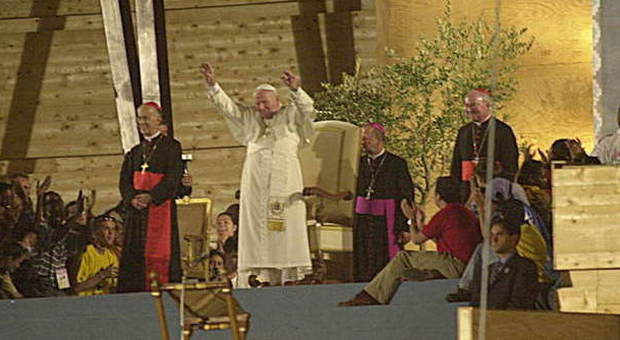I have thought of that reply many times. There are many ways of presenting good as a possibility, the beautiful as accessible, the ethics of existence. But so often communication of goodness does not succeed. It doesn’t reach the centre of a person. It remains on the surface. The words seem to brush their thinking without being convincing, without mobilising the interior decision to change. Not only to do something new but to be greater and different. To overcome the inertia of habits acquired.
That sobbing girl had understood. She had understood the words pronounced by John Paul II. Those words had created a comparison not with an abstract concept but with her own daily life. They hadn’t provoked a refusal, nor a justification, nor the move to self-absolvent defence. Her tears seemed more the expression of a joy because she had discovered that the best is possible. More than the best, first paradoxically searched for in the usual taste of the momentary, of the episodic, of the purely superficial, which is not the best. The basis of those tears was the recognition and the discovery of a new route that the young woman had now begun. It was a joyous beginning at the end of a day full of sensations, it was blessed with an expressive form which is exquisitely human – with tears.
Why was John Paul II so beloved by the young? The reply is: because he understood them. And, in consequence, he loved them. I asked the young people themselves in Toronto, Buenos Aires, Tor Vergata and Manila … and the reply, with little differences in shading, were often identical: “Nobody, neither my family, nor at school nor in my society have told me what he said. And he is right.” And yet the things he said often went in the opposite direction of presumed culture. Why did they – the young – say so vigorously that “he was right”? There are the “educators” who seem to be extraordinarily clear in saying what you shouldn’t do and what you shouldn’t be. But at the same time don’t seem to have the same clarity in defining and saying what you can be and where you should be going if you wish to be the best you can. This backward ethic produces friction through ambiguity. It cannot raise enthusiasm.
John Paul II confirmed. He was pro-positive. He didn’t pamper the young with useless pandering. He was exacting. He spoke of a possible challenge but one which is clear and magnificent. He spoke more of the wonder of human love than the risks of an impulsive sexuality. He rarely spoke of selfishness but instead, and nearly always, of how a world full of generosity would be wonderful. In fact, listening to him made it seem obvious that the only world possible should be one built on thinking a little more of others and a little less of oneself.
The expression “John Paul II, the great communicator” is true but can be misleading. He was a great communicator not only for the way – although that was splendid – he communicated as much as for the content of what he communicated. And that is why the young people, replying to the question, said “he is right”. One doesn’t say ‘you’re right’ to a lovely voice or to a magnificent expressive form. You say ‘you’re right’ to one who tells the truth. To one who affirms the truth.
The roots of that magnificent acceptance of John Paul II’s teaching among the young people was that he knew how to make virtue fun. He made it alive, passionate, attractive. In fact, a necessity. He never laid down a principle, a formulation of rules, an abstract of propositions. When he spoke to them, he gave truth and goodness a reason: thrilling, an argument for a truly human life. And he did it by showing the beauty of values, the universal attraction of faultlessness. In his talks with young people the basic theme was always truth. The truth of things. The truth – and therefore by contrast the false – which can or cannot be present in one’s own existence. In two brush strokes he showed the contrast between a misleading conventional sophistry and the consistency of real things. Like this, the beautiful, the good and the true appeared always united in him in a proposal that could fill – up to the brim – his own biography. Therefore he didn’t only say what goodness was but taught how to be good.
The young people always asked him about his relationship with God. And John Paul II showed them that God is not a normative code nor a belief but a Person in whom one believes, in whom one hopes and with whom one lives an intense love, faithful and reciprocated, for the whole of life. In God you can entrust your own existence; but to a moral code not even a day. This extraordinary concreteness, congenial with his way of being very direct and immediate, corresponded completely with the essence of his Christian religiousness, with the sanctity of his life. With the youth the alliance between the message and existential living literally exploded. The young people saw that that manner of speaking of God poured out from personal experience which had matured throughout the life of John Paul II. It wasn’t the repetition of pages from a book written by somebody. The words which they heard contained all the blood and flesh of that Pope who spoke to God because he knew and loved him. The youth who listened to him understood the truth of his message, “He is right …”
Translation by Antoinette Canini
© All rights reserved
© RIPRODUZIONE RISERVATA
